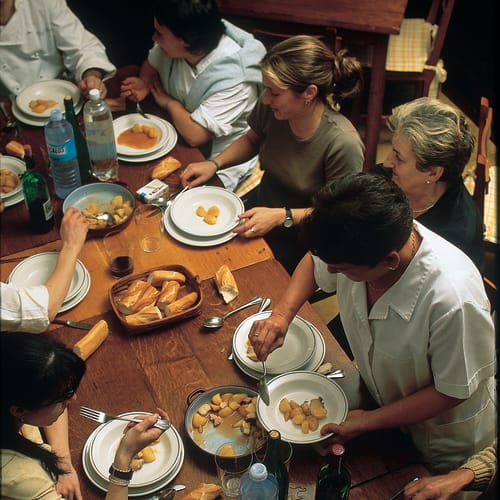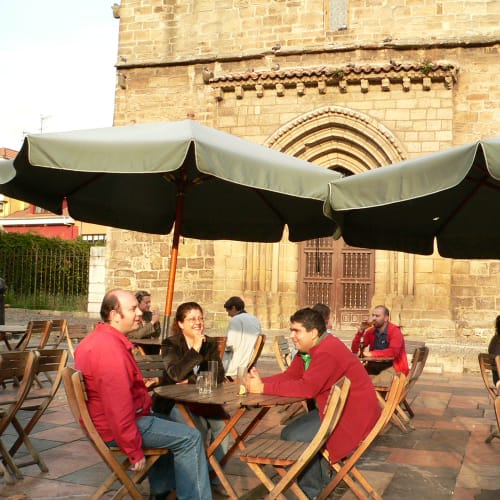Three Kings Sale - Up to 40% Off! Shop Sale
Sharing a Meal in Spain
September 2005




When my wife Ruth and I entered a Spanish restaurant for the first time, we gained a key insight about the Spanish people. As the waiter was seating us, the others in the dining room looked up from their meals and quietly greeted us. Moreover, throughout the time we were eating, people said 'goodbye' to the rest of us in the dining room as they finished their meals and went on their way.
This routine - almost a ritual - of acknowledging one another when dining in a restaurant is an example of the intimacy of interchange that is the defining characteristic of the Spanish people. They seem to be saying to one another, 'We are all in this life together, with our common needs -- why not enjoy each other's company.'

To the Spaniard eating is far more than the process of satisfying hunger ('putting on the feed-bag', as my mother would jokingly say). Spaniards take dining seriously. Several times in the course of a day they pause to eat with their colleagues or family members. Dining in Spain is a shared experience even though individuals are eating at their separate tables.
When I was young and foolish, I was convinced that when touring Spain one needed to be efficient - there were so many wonderful things to see: countryside villages, Roman ruins, pilgrimage churches, and so little time. We would investigate one town in the morning then stop by the local market to buy some fresh bread, cheese and a bottle of wine for a quick picnic by the side of the road. In twenty minutes, we would be on our way to the next destination zipping along byways that were completely devoid of traffic. No more dodging slow and noisy trucks - the drivers were having dinner and a little siesta.
It seemed that everyone in the countryside had stopped what they were doing and were having a leisurely meal together! I thought to myself, 'What an enormous expenditure of time, when there are so many things to see and do.' It was only a while later that I realized that I was missing the essence of Spain. Visigothic churches may be fascinating, brooding castles may be remarkable, but a leisurely dinner among the Spaniards was far more important if we wished to know Spain and her people. In some circumstances, efficiency may be a virtue - but not to the traditional Spaniard if it is going to compromise the quality of his life.
The food normally eaten in the restaurants is nothing flamboyant or pretentious it is just good, fresh food prepared from local recipes. It is a straightforward and honest expression of the region in which it is prepared. With seventeen autonomous regions, there are a seemingly infinite variety of dishes. Celtic Galicia serves wonderful caldos - stews in pots bubbling with leeks, garlic, ham, chunks of beef and pork, kale, collards and potatoes. It is a little reminiscent of other Celtic countries such as Ireland. On the other hand we could just as easily be eating paella or arroz a banda in the Mediterranean port of Valencia, where its long Moorish immersion is reflected in age-old recipes of rice and saffron.
What I find remarkable today is that the New Spain, with all of these venerable region-specific cuisines under her belt, is now in the vanguard of European cuisine. It is as if traditional Spain's various culinary threads have now been woven into a tapestry that the whole world admires!
To celebrate this trend, in our on-line recipe section we have added almost 200 new recipes - some of which are quite exotic -- reflecting the creativity of the new chefs of Spain. The Spanish Institute for Foreign Trade (ICEX) publishes a most impressive English language professional publication called GOURMETOUR which reports on both the old and the new cuisine of Spain. The editor-in-chief Cathy Boirac has generously opened their 'recipe box' for all of us to enjoy.
The next time you grab a bite to eat and hurry on your way, remember that dining is also a time for the refreshment of your spirit in the company of others. That sense of companionship is central to the traditional way of life in Spain. The Spanish culture is richer for it.
Tu amigo,
Don

